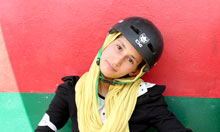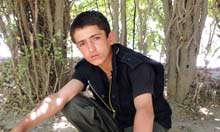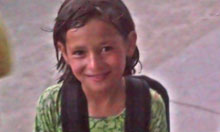By Emma Graham-Harrison
Nawab had been crowned the best skateboarder in Afghanistan, a joker and unofficial leader of the unruly gang. Mohammad Esa was perhaps the cleverest of his friends, always studying or lost in dreams of the day he would become a doctor. Khorshid was an uncompromising teenager whose name meant sunshine but whose character was steel, always ready to show the boys she could do anything they could, despite growing up in a country that is not kind to women.
They sold scarves and bracelets to the foreign soldiers, journalists, diplomats and aid workers who filtered in and out of Nato's heavily guarded Kabul headquarters.
Customers saw a group of scruffy children who should have been in school, racing to close a deal; but the competing hustlers were a close-knit group of friends who shared earnings as well as jokes, and often skateboarded or studied together when they were not chasing business.
The boys had helped Khorshid's family throw up their modest mud-walled home by night, to avoid police fines for building on public land. On a recent holiday they walked several miles to a reservoir out of town, to swim and picnic, before walking all the way back again to work in the afternoon. In a country splintered by bitter ethnic divisions, they were an unusual mix of Pashtuns and Tajiks.
But on Saturday a teenage boy in a white shalwar kameez walked onto their patch, and when some of the boys told him to leave, an argument broke out. It escalated into shouting, then blows, and then ended abruptly when the stranger pressed a hidden trigger and detonated a suicide bomb, according to 14-year-old Reza, who survived because he had wandered off to buy a snack, watching the dispute from a distance.
Police said the bomber was probably aiming for the nearby Nato or US embassy gates. He may have panicked when the children blocked his way, or perhaps given up hope of getting past them when the fighting began. One survivor does not even remember a fight, which raises the possibility the children were the target.

Khorshid. (Photo: Skateistan)

Mohammad Esa. (Photo: Skateistan)

Parwana. (Photo: Skateistan)
The blast was relatively small by the brutal standards of Afghanistan's decade-long war; eight people killed and perhaps a similar number wounded. But it has ripped apart the circle of friends. Nawab, Mohammad Esa, Khorshid, her sister Parwana and young brother-in-law Asad are dead, and two others from the group in hospital with serious injuries.
"When I go to bed, my friends are all waiting for me, asking me to come swimming," said 14-year-old Omid, one of the group who was travelling in to work when the bomber struck. "I see their faces, and I can't sleep."
Several of the dead were also the main breadwinners for their families; one father disabled, another a drug addict, with many younger brothers and sisters to feed. Their killings bring more than just the agonising loss of a sibling or child to grieving families.
They are the latest children to suffer in a war that damages hundreds of young lives each year. "1,756 children were killed or seriously injured as a result of the conflict in 2011, which equates to nearly five children a day," said Unicef spokesman Alistair Gretarsson.
In Nawab's home, packed with dozens of mourners, his family remembered a quiet 16-year-old, who liked eggs for breakfast when he could afford them and ignored their pleas to stop working near Nato. "He was a very serious person, busy from morning to evening with his business," said his mother, Anisa, her face bruised and scratched from where she had battered it in mourning. "After God, he was the person who fed the family."
Nawab was different with his friends, says Omid, he was a joker and a natural leader, who looked out for the younger kids. He won the "Go Skateboarding" competition this year, and worked as a volunteer skateboarding teacher.
He is buried nearby in a new graveyard that is marching up a hill, coffin by coffin, testament to the steady toll of the war and poverty in Afghanistan. There is a spectacular view of the city from his burial mound, where Omid stared at the dust and swore revenge. "I have to find the people who killed my friend," he said. "I want to become a pilot in the army."
Khorshid, 14, and Parwana, 12, are buried a few miles away, in a sprawling graveyard overlooked by their family home, where 16-year-old Nilofar is mourning two sisters and a husband she had married only 20 days before his death.
Khorshid too had loved skateboarding, fearless on the board as she was in life, taking to the streets in a country where women who do any kind of work, even in well-protected offices, are regularly harassed both outside and inside their homes.
She worked as a skating instructor for the charity Skateistan, which, in an online tribute, quoted her saying: "If you are scared you end up doing nothing and without doing you cannot achieve anything. But if you do things, all that can happen is you succeed or fail."
Her six-year-old sister Mersal survived the blast because she was playing down the street, but saw both her sisters' bodies. "Khorshid was broken," she said, her eyes filling with tears. "Do you have any pictures of my daughters?" their mother, Jemila, asked a visiting journalist. The family was too poor to have a single print of their children.
The families of those who survived have banned them from working outside Nato, and are filled with relief. "We have told him to stop working and just concentrate on school," said Reza's older brother Mustafa. But the children themselves are haunted by their own escape, in a country where only a tiny minority have access to counselling services.
"I looked down at myself and saw I was covered with blood, then I passed out," said Naved, 15, stranded in Kabul's emergency hospital with a shattered hand and shrapnel wounds to his shoulder, leg and side. "When I woke up, I saw the bodies of my friends lying on the ground and tried to go closer, but the police stopped me."
He survived the bomb because of a chance thirst; he had walked a few metres down the street to a handpump a minute before the bomber detonated.
Three years ago another bomb killed a group of street children just a few metres down the road, but many in the group have the recklessness of kids around the world, made many times more dangerous by their surroundings. "I never thought it might be dangerous," Naved said of working near the heart of the western military mission.
Elias, in hospital with serious injuries to his legs, ignored his parents' warnings that the national holiday might attract attacks and went into town with Nawab. "I think I was closest to the bomber, but God saved me. I don't know why." He doesn't know what he will do when he gets out of hospital. "I have no feelings now, except sadness for my friends who are dead."



